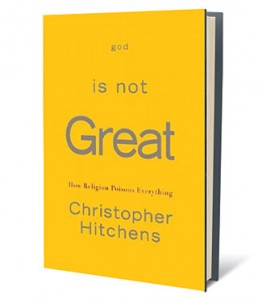A colleague used to visit my cube and say something like “Hitch-em-up’s at it again” and we’d both chuckle with understated glee. By this he meant that the notorious Christopher Hitchens had penned yet another controversial article and that I must absorb it as quickly as possible. My colleague and I were the subversives in the cube farm, and therefore had to keep our true thoughts beneath the covers lest we be tortured like heathens in the Dark Ages. This was the genesis of my Hitchens introduction (sometime circa 2009), at least as far as I was aware, and Slate or Vanity Fair was probably the medium. I was quickly hooked. After this, I began to notice that Hitch bean appearing on such modern outlets as the Bill Maher show, YouTube, and Rupert Murdoch’s fascist Fox News – always as adversary. Anyway, my intro was complete and although not always agreeing with the irascible English ex-pat, I admired the temerity of his spirit and the undeniable depth and girth of his gonads.
I shamefully admit that the first Christopher Hitchens book I read is “god is not Great”; most likely his last or perhaps second to last as the poor fellow appears to be dying of cancer. Nature rest his poor soul. I’ve much to catch up on. At some point in the middle of this slap-em-silly comeuppance or what a valedictorian from Alabama might call an ‘ass whuppin’, I decided I must write a review of this verbal lashing of all the authoritarian fascists who have ever bull whipped an unfortunate or condemned a thinker or enslaved a woman. Today, not unlike during the Dark ages with slightly less tyrannical oppression in the West, the punishment for original or out of the box thinking is still death – as the poor Dutch filmmaker found out in his once liberal hometown – and as Christopher Hitchens, Bill Maher and Hirsi Ali find out via daily threats.
I spent some time thinking of a reviewing strategy; wing it or old school or something else? I know no one reads book reviews anymore or quite frankly, reads much of anything except celebrity gossip, but I’ll do this for the few and far between even if I’m the last Gilligan on the Island.
Hitchen’s book is largely a Historical one fueled by research, experience, observation and contempt. Historical figures of all stripes appear from Greek, thinkers to Enlightenment Rationalists, to modern day fanatical hucksters. Original ideas are limited, but the few proffered are significant. The vocabulary is outstanding and gives a thrill to word lovers. I’ll mention a few just to wet your whistle: Degustatative, Ordure, Propitiary, Suppurate, Onanism, Pullulate, Orrery, Tautology, Imposture, Solipsism, Syncretic, Irredentist, Lapidary, Farrago, Meretricious, Soporific, Sagacious, Extirpation. I suggest you look up any you’re not familiar with as they’re all beauties and the perverse among you will get an extra thrill since a few are more elevated terms for some common vulgarities. The great irony of this work is that it will be read by the doubters, the Agnostics, the Atheists, the Deists and the Pantheists but probably not by the Fundamentalists, the pious, the clergy, the conservatives or the Taliban. This is indeed a shame.
I began by writing synopses of each chapter; but quickly realized that maintaining style, clarity and variety would be too big a challenge. So I reverted to a bullet list format. This is my version of our high schools’ Cliff’s Notes. My hope is that these cryptic phrases will spur all to read the book. At the conclusion, I will offer commentary. This is an atypical but hopefully worthy approach. Jump aboard Heathens, Heretics, and the holier-than-thou.
Chapter 1 – Putting it Mildly
• Genesis of own doubts about religion
• Green tree color light bulb moment
• Unimpressive logic of Blaise Pascal
• Fate of medieval female victim
• Discussion of Freud
• Morals of Literature superior to Scripture
Chapter 2 – Religion Kills
• Quotes John Stuart Mill and Father
• Atrocities of B’s: Belfast, Baghdad, Beirut, Belgrade, Bombay and Bethlehem
• Serbian Orthodox Church’s contribution to Serbian war
• Anglican irrationality and support of crusades
• Mother Teresa protests divorce in Ireland
• Religions virulent hatred of one another
• Pat Robertson and Jerry Falwell’s absurd proclamations post 9/11
Chapter 3 – A Short Digression on the Pig; or, Why Heaven Hates Ham
• Dietary prohibitions of Religion
• Pigs very human-like
• Muslims adopt ban from Jews
• Muslim banning of George Orwell’s “Animal Farm”
• Allusions to “King Lear” and “Lord of the Flies”
Chapter 4 – A Note on Health, to Which Religion Can be Hazardous
• Heinrich Heine quote
• Polio vaccines being denied by Muslims in Nigeria and Calcutta
• Catholic prohibition of condoms
• Muslim prohibition of condom use in Indonesia
• Science breaks religious monopoly on truth
• Genital mutilations
• Denial of health care
• Muslim marriage at age 9
• Vatican cover up of pedophiles
• Religions attempts to control sex
• Favoring of males
• Religion looks forward to the destruction of the world
Chapter 5 – The Metaphysical Claims of Religion are False
• Religion comes from infantile prehistory
• Founding Fathers largely Deist
• Rationality of Laplace, Nietzsche and Socrates
• The tyranny of powerful religion
• Introduction of Ockham’s razor
• Failure to answer the Ontological argument
Chapter 6 – Arguments from Design
• William Paley’s designer nonsense
• Natural selection
• The imperfections of the human eye
• Other human physical imperfections
• Burgess shale – Pikaia
Chapter 7 – Revelation: The Nightmare of the “Old” Testament
• Preposterousness of revelations
• Obscure un-witnessed personages
• Can’t all be true by definition
• Shady history of 10 commandments
• The things missing from commandments
• Massacres ordered when Moses descends Sinai
• No evidence of Exodus by Israeli archaeologists
• Slavery – ethnic cleansing – bride price
• Contradictions in stories of Moses
• Incongruities of ages and numerous offspring of Moses
Chapter 8 – The “New” Testament Exceeds the Evil of the “Old” One
• Fascist Mel Gibson movie
• Disagreements among Gospels
• Gnostic Gospels
• Conflicting accounts of birth of Jesus
• Human need for virgin birth
• Full of Astrology
• C.S. Lewis – all or none statements on Jesus
• Inconsistent writing style of Gospel of John
Chapter 9 – The Koran is Borrowed from Both Jewish and Christian Myths
• Revelation to an illiterate
• Only valid in Arabic
• Resistance of Religion to translation
• No reformation in Islam
• Islam a set of plagiarisms
• Accounts way after events like Bible
• Sunni-Shia childish conflicts
• Different versions
• Problems of Hadith – stolen from Jewish/Christian texts
• Internal contradictions
• Salman Rushdie’s exodus
• Mecca closed to non-believers
• Rage at attempts at Koranic scholarship
Chapter 10 – The Tawdriness of the Miraculous and the Decline of Hell
• Voltaire quote
• David Hume grants free will on Miracles
• Likelihood of miracle vs. delusion
• Why decline of miracles?
• Frequency of resurrection in the New Testament
• Exceptional claims require exceptional evidence
• UFO superstition
• Testifying against Mother Teresa
• Natural disasters explained as God’s wrath
• Superiority of Artists to Religion
• Lost adherence to Marxism
Chapter 11 – “The Lowly Stamp of their Origin”: Religion’s Corrupt Beginnings
• Freud and Edward Gibbon quotes
• Kudos to Thomas Hobbes’s Leviathan
• How cults begin
• American GI as savior of Papua New Guinea
• Evangelical hucksterism
• Herd mentality
• Instinct to be fooled
• Joseph Smith and Mormonism
• Daniel Dennett’s natural science
• All religions problems with those who lived before revelation
• Mormon genealogical database
Chapter 12 – A Coda: How Religions End
• False messiah’s
• Death of gods and ancient religions
• Odd sects: Chabad, Lubavitcher, Millerites, Donme
• Thin line between advancement and demise
Chapter 13 – Does Religion Make People Behave better?
• MLK and his drawbacks
• Jesus first alludes to punishment after death
• Christians involved in slave trade
• Thomas Paine – Frederick Douglass – Thomas Jefferson – William Lloyd Garrison
• Lincoln’s religious doubts
• Segregation and discrimination blessed by Southern Churches
• Martin Luther’s bigotry
• Koran’s support of slavery
• Gandhi as less than considered
• Nehru’s secular position more important than Gandhi’s
• Evelyn Waugh’s wickedness arises from his Catholic faith
• Ugandan horrors led by Christians
• Rwanda largely Catholic
Chapter 14 – There is no “Eastern” Solution
• Personal experience with Guru
• Sri Lankan Buddhist and Hindu conflicts
• Buddhist led pogroms against Tamils
• Japanese Buddhism – loyal servant of Imperialism and mass murder
• Buddhists join with Nazis
• Zen considers life and death indifferently
• Contempt for the intellect not passive
• Preaches submission and resignation
Chapter 15 – Religion as an Original Sin
• Religion immoral
• Presenting a false picture of the world to the innocent
• Doctrine of Blood Sacrifice
• Doctrine of Atonement
• Doctrine of eternal reward/punishment
• Imposition of impossible rules and tasks
• Abraham’s agreement to murder his son
• Slaughtering of Jewish Lubavitchers by Arabs
• Muslim/Jew battles over same site
• Hebron massacre
• Sacrifice of Jesus
• Sin of Adam
• Collectivization of Guilt
• Blame the Jews
• 10 commandments impossible to obey
• No masturbation
Chapter 16 – Is Religion Child Abuse?
• Quote from the Brothers Karamazov
• Disgusting priest in Joyce’s Novel
• Terrifying Children
• Refining torture
• Religion must attack before the Age of Reason
• Immoral practice of circumcision
• Destroy pleasure of sex
• Rape and torture of children
Chapter 17 – An Objection Anticipated: The Last Ditch “Case” Against Secularism
• Totalitarianism bound to religion
• Orwell cited
• John Calvin’s murderous cruelty
• Fascism arose in Catholic countries
• Church’s pact with Mussolini
• Catholic pact with Nazism
• Corruption of Pius XII
• Catholic rat line for Nazis to South America
• Japanese fascists had god King
• Church admits collusion with Fascism
• Catholic fake Einstein letter
• North Korean Totalitarianism has Religious element
• Humanists have much to apologize for but…
• Totalitarian systems Fundamentalist and Faith based
• Anti Semitism essentially Totalitarianism
• Vatican against Jews
• Apartheid as racist Totalitarian system
• Khmer Rouge sought authority in legends and Temples
Chapter 18 – A Finer Tradition: The Resistance of the Rational
• Suppression of Rationalists
• Nonsense of “Christian” painting and Islamic “Medicine”
• Death of Socrates
• Conscience is innate
• Religious assert limited and literal mind over ironic and inquiring one
• Discussion of Epicurus and Democritus
• Lucretius’s great work “On the Nature of Things” nearly destroyed by Christians
• Aristophanes a doubter
• Religions terror of science
• Spinoza fleas to Holland – condemned by Fundamentalist Jews
• Einstein believed in Spinoza’s god
• Discussion of Pierre Bayle and Voltaire
• Immanuel Kant’s convincing arguments against reasoned theism
• Discussion of David Hume and Edward Gibbon
• Benjamin Franklin irreligious
• Thomas Paine’s “Age of Reason”
• Discussion of Darwin
• Hanukkah stolen from Christmas
• Jewish Macabees’ murder of Hellenic Jews
Chapter 19 – In Conclusion: The Need for a New Enlightenment
• Religion as philosophy with the questions left out
• Iran’s dangerous theocracy
• Caricatures of Muhammad in Denmark
• Pope condemns cartoons
• Religion has run out of justifications
• Need Enlightenment of Humanism and Scientific Inquiry
Afterword
• Discussion of book tour
Commentary
“god is not Great” is a rich Historical account of vile, tyrannical, and murderous behavior. To deny the detailed incidents would be akin to denying the holocaust or 9/11 – it won’t hold water. The crusades, the Rwandan genocide and the Spanish Inquisition all occurred – as did the Vatican suppression of exposed pedophiles, establishment of the rat line to South America and collusion with fascist governments. Yet, rather than take a deep dive into the meat of the material, I’ll assume the reader enjoyed my Greg’s notes or even better, read the book; and I’ll instead concentrate on the limitations of the work. This is a unique and impressive book and I highly recommend it; yet, like all public works, it invites critique.
I’ll start by saying Hitch’s book is one-dimensional and I don’t necessarily mean that as a criticism. He may indeed have intended it this way, but it nevertheless needs mentioning. To begin with, it’s debatable the degree to which many conflicts are truly religiously inspired. I recall when a friend first mentioned that Al Qaeda may not really give a damn about religion but only use it as a rallying cry. Is the Jewish Palestinian conflict about religion or possession of land? Was the Hutu-Tutsi genocide a religious or tribal conflict? Is religion merely a subset of tribal affiliation? What about the Irish Protestant Catholic situation? Were the crusades about smashing Islam or reclaiming the Holy land and the all important claim of cultural supremacy? Are conflicts that appear religious based more often than not cultural clashes or the even more fundamental land or resource grabs? Is religion an excuse or only a piece of the puzzle? This is complex stuff but to name all conflicts as essentially religious simply because its perpetrators adhere to some superstitious cult is too simplistic. This issue requires meticulous multi-dimensional scholarship. Religion is an excellent ruse for motivating the gullible, but can’t it be argued that many conflicts boil down to the old reliable mainstay of us versus them? Hitchens often speaks of our crude mammalian heritage; and here, he’s right on target as the ancient tribal dynamic of “other” is lodged in our DNA. This is the real fear-based root of many conflicts and is most of all very difficult to overcome. I’m sure we could blame some ancient Home Sapiens’ massacre of a group of Neanderthals on face paint or silly War dances but it’s more than likely the woolly Mammoth lying in the opponents den.
Another area that gets short shrift in Hitchen’s book is the idea of the transcendent. He does mention the awe we all feel at the site of a sunset and how we needn’t attribute it to the supernatural; but this is the extent of his discussion. Again, I don’t think this was his intent; but religion at its grandest must address the metaphysical. Whether a delusion of brain circuitry or a glimpse of the eternal, heightened periods of awareness are real, even if drug induced, seem to lift the veil from reality. Art sometimes results from these elevated levels of consciousness and Hitch happily admits the superiority of morals in Literature to those in Scripture. An analysis of the atom eventually leads to nothing, another perplexing metaphysical conundrum. So indeed, if the universe is a fluke and life is meaningless, which seems highly likely, something ineffable and mysterious remains. To suggest life is an accident to a creature capable of weeping at a sunset while listening to Mozart and sipping fine Champagne seems incredibly odd and even cruel. Yet such may be our fate. I don’t wish to belabor this point, but only introduce it. Surely a discussion of the transcendent, a musing on the mystical or an analysis of the great question, “Why is a suitable and even necessary discussion of any religious tome”?
Finally, suppose we discard our primitive, superstitious, religious institutions in favor of an enlightened secular humanism. Does this guarantee a better society? Even Hitchens admits not, being the crude, violent, selfish mammals that we are. Yet secular humanism may give cause for hope. Buy to the more practical minded, the pertinent question may be – what do we do with “Jingle Bells”, the Sistine Chapel and “our thoughts and prayers are with you”? In other words, how can we upgrade a culture that springs from the leaky foundation of the Christian myth? Our funerals, our weddings, our Holidays, our rituals, our Christmas songs, our paintings, our movies, our everything springs from the same well. Even our science, forget not the brilliant Gregor Mendel, springs from its Christian cultural seeds. How do we deal with these artifacts in a secular world? What are we to do with “A Miracle on 34th Street” or “How the Grinch Stole Christmas”? Of course, we do nothing. Even the most militant atheist might admit he likes sitting in Church or loves the Grinch or that Christmas decorations make him smile – just as Christianity melded ancient myths to form its own fairy tale – our cultural institutions can move forward with perhaps slight secular modifications along the way. Maybe when singing “Oh little town of Bethlehem”; we can tell children of the ancient myth without filling their heads with absurd nonsense. Certainly Hitchens would prefer this. Nevertheless, rest assured, cultural institutions die slowly and Christianity’s overarching dominance of Western culture will remain in some residual form long after a progressive secular humanism has ascended. Few will have trouble with this as most are fond of our little rituals like Carol singing at Christmas or costumes at Halloween. And mustn’t we do something dramatic when someone dies if only to celebrate their existence and give ourselves a bit of dignity? The topic of religious cultural artifacts in a secular world would make for a fascinating book so I hope some scholar out there will grab it and run.
Ut epitome
This book is an essential comeuppance History informed by undeniable scholarship. It makes no claims for multi-dimensionality; so, I’ve addressed that as one of limited talking points. The main theme is clear as must be the sense of glee felt by those who like to see Scripture bitch-slapped like a Sean Connery wife or enjoys witnessing the Big 3 plus Buddhism get eviscerated like a goat at Eid or jumps with joy at the Catholic Church getting rump rammed like an Altar boy at Christmas. It’s all there plus so much more, all in a highly referenced, anecdotally rich, occasionally ironic, scholarly attack. To the pious the gauntlet has been thrown; and be there a polemicist in their midst, a rich source of material has been divested. Is it time to put the gloves on holy believers, or drop to all fours and turn the other cheek?
Review of "god is not Great",




Smike
6 Mar 2011I’m a huge Hitchens fan. I’ve already read the book, but I liked your review.
EinsteinLite
7 Mar 2011Thanks Smike. That’s the funny thing, Hitchens’ fans will read…others not……glad you got something out of it…
Joker
8 Mar 2011Great review! Kudos! Really like people who get into more critical and deeper thinking…